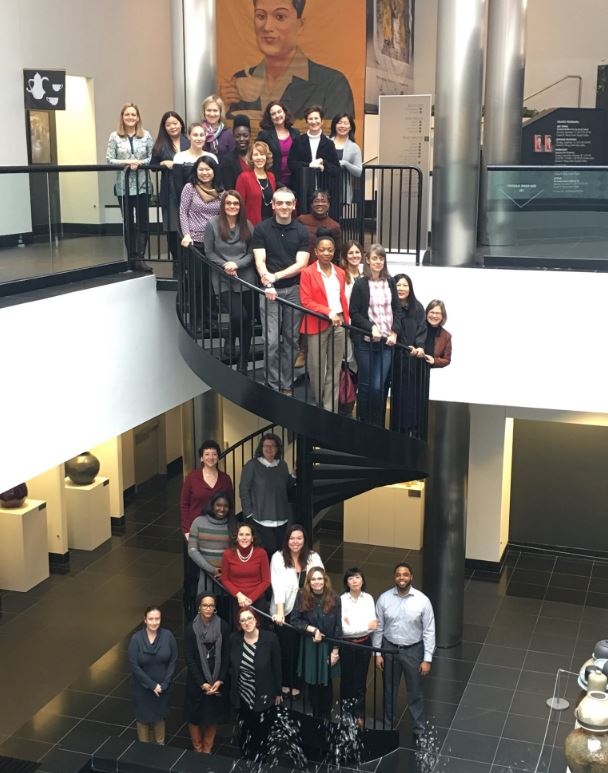GCC Mid-Atlantic Regional Meeting
 What is the greatest challenge you face at your institution? What programs and resources have you offered that made the greatest impact? What are the models for collaboration that exist at various institutions? These were a few of the questions addressed at the GCC Mid-Atlantic regional meeting hosted by Stony Brook University in December 2017. The gathering brought together approximately 30 members from 17 institutions to share best practices in career and professional development for graduate students and postdocs. Natalia Chernets at Thomas Jefferson University summed it up quite nicely, “As a trainee member, I appreciate the chance to attend the regional GCC meetings to learn about best practices and challenges at other institutions as it gives me an overview of the field and stimulates ideas that I would like to bring back to my home institution.”
What is the greatest challenge you face at your institution? What programs and resources have you offered that made the greatest impact? What are the models for collaboration that exist at various institutions? These were a few of the questions addressed at the GCC Mid-Atlantic regional meeting hosted by Stony Brook University in December 2017. The gathering brought together approximately 30 members from 17 institutions to share best practices in career and professional development for graduate students and postdocs. Natalia Chernets at Thomas Jefferson University summed it up quite nicely, “As a trainee member, I appreciate the chance to attend the regional GCC meetings to learn about best practices and challenges at other institutions as it gives me an overview of the field and stimulates ideas that I would like to bring back to my home institution.”Thomas Jefferson University presented their “Mentors in Motion” program that knits together wellness with career conversations in a low stress atmosphere. Chernets says, “Our Mentors in Motion program was inspired by the 1st Train the Trainers meeting at NIH, “Walk with a Doc *” organization and an organized “netwalking” event at the AAMC GREAT Group annual meeting. *Walk with a Doc (http://walkwithadoc.org/). Mentors in Motion program was designed to empower networking and mentoring between Jefferson postdoctoral fellows, graduate students, faculty members and alumni while engaging in healthy physical activity (walking). Our program was held weekly (rain or shine) from July to October 2017 and included monthly themes, such as Careers in Academia and Life Outside the Lab.”
We were inspired by our international guest, Remi Moss, from Okinawa Institute of Science and Technology who is building a program from the ground up including professional development courses for first year PhD students are her institution. As a new doctoral granting institute in Japan, they are hoping to learn as much as they can from U.S. institutions in the field of career development. Moss commented, “It was encouraging to meet colleagues who are passionate about graduate students’ career development and are supportive of my efforts at Okinawa Institute of Science and Technology to build a unique professional development curriculum for our Ph.D. students. I am definitely looking forward to connecting with them at the national conference in June.”
Two other highlights of the regional meeting were the ImaginePhD user experience conversations led by Susan Martin, from University of Maryland, College Park and LabLearner’s Dr. Christine Jurasinski and Jaclyn Welles presentation their internship opportunities for current graduate students. In small groups, GCC members reflected on using the ImaginePhD tool and suggestions will be brought back to the team as them implement changes for version 2.0 of the ImaginePhD online career assessment and planning tool for humanities and social science Ph.Ds.
LabLearner is a 100% hands-on system of PreK-8 science education that includes a fully equipped in-school laboratory, complete curriculum including all assessments, and teacher professional development. Everything students learn about science with LabLearner, they learn through hands-on experiences. LabLearner hires PhD candidates to help with lab installations at schools across the country, as well as training teachers and providing ongoing support for the curriculum and experiments. LabLearner generously sponsored the lunch at the regional meeting this year.
The mission of the Graduate Career Consortium is to lead the advancement of the graduate-level career and professional development community by engaging and nurturing the unique nexus of expertise, knowledge, resources, and people in the community.
Amy L. Pszczolkowski
Assistant Dean for Professional Development
The Graduate School, Princeton University